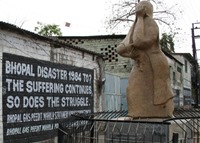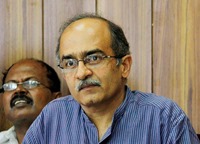The Bench and the Bar
SCOI Reports
 The escape of about 40 tonnes of methyl isocyanate (MIC) – a highly toxic chemical – from a storage tank on the premises of the pesticide plant of Union Carbide India Limited (UCIL) in Bhopal – the capital of the State of Madhya Pradesh – on the night of 02/03 December 1984 resulted in a horrendous disaster. Due to criminal negligence and utter callousness on the part of the plant management in taking adequate safety precautions, water and other impurities – that cause MIC to react violently – entered one of the MIC storage tanks resulting in exothermic reactions and forcing MIC and its reaction products to escape in the form of froth and lethal gases.
The escape of about 40 tonnes of methyl isocyanate (MIC) – a highly toxic chemical – from a storage tank on the premises of the pesticide plant of Union Carbide India Limited (UCIL) in Bhopal – the capital of the State of Madhya Pradesh – on the night of 02/03 December 1984 resulted in a horrendous disaster. Due to criminal negligence and utter callousness on the part of the plant management in taking adequate safety precautions, water and other impurities – that cause MIC to react violently – entered one of the MIC storage tanks resulting in exothermic reactions and forcing MIC and its reaction products to escape in the form of froth and lethal gases.
Bar, Bench & Litigation
Justice Tirath Singh Thakur was on Thursday sworn in as the 43rd Chief Justice of India.
Bar, Bench & Litigation
The Supreme Court on Wednesday ruled the Tamil Nadu government has no suo motu power to grant remission and release the convicts accused of conspiracy in the assassination case of former prime minister Rajiv Gandhi.
The apex court’s constitution bench headed by Chief Justice HL Dattu said that the state government could grant remission and release the convicts only in consultation with the central government as the case was investigated and prosecuted by the Central Bureau of Investigation (CBI).
The court said this while answering reference by a three-judge bench which had asked the constitution bench to address seven questions framed by it.
Having answered the question of law, the court said the validity of the Tamil Nadu government’s decision to grant remission and release the convicts accused of conspiracy in Rajiv Gandhi assassination case would be examined by the three-judge bench.
In the case of heinous crimes, the court by a majority verdict held that it could sentence the accused to life imprisonment, meaning the whole life without remission.
Bar, Bench & Litigation
Special courts to hear corruption cases are on the Delhi government’s agenda, reported *Business Standard.
The government will consult Delhi high court’s chief justice to constitute courts to hear cases under the Janlokpal Bill 2015 and Prevention of Corruption Act 1988 to dispose of these cases at the earliest.
According to the provisions of the Janlokpal Bill, which was tabled before the Delhi assembly on 30 November 2015, the special courts will ensure completion of trial in the corruption cases within six months from date of filing and in rare cases, the time will be extended to one year more.
“To achieve the objective of a speedy trial, the Janlokpal will make an annual assessment of the number of special courts required for this purpose and will then make a recommendation to the government for creating such courts,” the bill reportedly states.
However public functionaries, including the Janlokpal, are exempted under the bill from giving evidence relating to ‘secret information’ or produce the evidence so reported or collected, it was reported.
Bar, Bench & Litigation
Allahabad high court has in a landmark judgment ruled that a child born out of rape will have inheritance rights over the property of the the biological father reported NDTV.
The court also discussed the need for rehabilitation of victims of rape and their children while adjudicating a matter where a minor child of 13 years was raped and could not abort her child due to medical reasons.
A Division bench of Justices Shabihul Hasnain and DK Upadhayaya appreciated the gesture of the state of UP for not fighting the case adversely and being interested in paying compensation to the victims and their rehabilitation in the judgment. The court noted that the victim was suffering from “Rape Trauma Syndrome” and needs care and attention to lead a healthy and happy life as guaranteed by the constitution as the fundamental right of the citizens. The court also expressed its concern over the well-being of the child born out of the crime whose family was unwilling to accept her.
Noting that the child will be treated as an illegitimate child of the rape accused and will have inheritance rights to his property unless legally adopted by someone, it was reported.
“We may observe here that in the matter relating to inheritance, the manner of birth of a person is irrelevant; the rights of inheritance of a person are governed by the Personal Law to which the person is subject irrespective of the manner of birth of the person. It is irrelevant as to whether the newly-born child of a rape victim is born out of consensual sex or otherwise,”
The court also warned the biological father against claiming rights over the child like visitation or custody. Eventually, the court asked the government to pay the victim 10 lakh apart from the 3 lakhs already paid by them and made several directions to ensure that she is able to absorb herself in the society again.
While parting, the court made an emotional plea with the society to not discriminate with such victims and said,
“All solutions and answers cannot be given by the courts. There are certain social problems and issues which have to be answered by the society itself. It is for the society to decide as to how it wants to treat a rape victim. We should remember that rape is a crime beyond the control of a victim. This tragedy can strike any family. It is not something for which the victim has to be blamed. The whole society should come forward in defence and help of the poor traumatized victim of rape. The society will have to learn to manage their response towards a victim without forgetting that tragedy can befall on one’s own head. When women are respected and promoted by the society as a whole only then a society can be called truly free and liberated. The question of rehabilitation of a rape victim can best be answered by the people and the masses and not by the courts alone. We, therefore, leave this question of rehabilitation of “A” open to the masses whose love and affection can save two normal lives from becoming two negative characters of the society in future. They should be accepted; not haunted by the society. The court has played its role within the parameters of law. Now it is the turn of the seekers of justice from the courts i.e. people of India to see and show their response to the victims of their society. “
Bar, Bench & Litigation
 The Delhi high court requested Delhi’s Patiala House district court to video-record the trial in the 1984 riots case, in a case transfer order won by senior advocates Colin Gonsalves and HS Phoolka for riot victim Joginder Singh.
The Delhi high court requested Delhi’s Patiala House district court to video-record the trial in the 1984 riots case, in a case transfer order won by senior advocates Colin Gonsalves and HS Phoolka for riot victim Joginder Singh.
Bar, Bench & Litigation
The Social Justice bench of the Supreme Court has agreed to examine the existing administrative and judicial guidelines relating to dowry cases, allegedly biased against females, reported The Indian Express.
A petition by NGO ‘Social Action Forum for Manav Adhikar’ (SAFMA), through advocate Jyotika Kalra, has alleged that the high courts have diluted the anti dowry harassment law by changing the conditions of mandatory FIR and arrest provisions in the law and compelling women to settle such cases.
SAFMA submitted a draft guideline related to FIR, arrest and grant of bail in cases lodged under Section 498-A to the bench of justices Madan B Lokur and Uday U Lalit for review. The court issued notice to the government and sought its reply in the matter.
Focusing on the unequal bargaining capacity of women in India who fear societal pressure and depend on others for financial stability, the draft regulations vouch for not forcing the woman to compromise and helping her to form a uniformed decision. It has also sought police be made to give written reasons for not arresting accused in such cases.
Bar, Bench & Litigation
Remaining seated while the Indian national anthem is being sung or played is not punishable under Indian statutory or case law or by any order of the Indian government, argues the Express
Section 3 of the Prevention of Insults to National Honour Act 1971 – the statutory law on the subject – only penalises the offence of disrupting the singing or playing of the national anthem. It does not make it mandatory to sing or play the anthem.
Government of India orders issued on 5 January 2015 make it mandatory to stand up when the anthem is being sung or played, but prescribe no punishment for not obeying this order.
The Supreme Court in 1987 ruled in favour of three students who were expelled from a school in Kerala because they were standing up but not participating in singing the national anthem when it was being played. The students had asserted that they were against singing anything other than what their Jehovian religion prescribed. The two judge SC bench had, in its order, observed: “Our tradition teaches tolerance; our philosophy preaches tolerance; our Constitution practises tolerance; let us not dilute it.”
Bar, Bench & Litigation
 Senior advocate Shanti Bhushan and advocate Prashant Bhushan have dubbed the proposed draft Jan Lokpal Bill 2015 as the “Jokepal Bill”, and have alleged that it is a ‘maliciously’ weakened draft of the original Lokpal Bill of 2011 by Delhi chief minister Arvind Kejriwal and his Aam Aadmi Party (AAP). If at all the centre passes the bill it will be an instrument in the hands of the Delhi government to save its own legislative assembly members, allege the Bhushans.
Senior advocate Shanti Bhushan and advocate Prashant Bhushan have dubbed the proposed draft Jan Lokpal Bill 2015 as the “Jokepal Bill”, and have alleged that it is a ‘maliciously’ weakened draft of the original Lokpal Bill of 2011 by Delhi chief minister Arvind Kejriwal and his Aam Aadmi Party (AAP). If at all the centre passes the bill it will be an instrument in the hands of the Delhi government to save its own legislative assembly members, allege the Bhushans.
SCOI Reports
As the Chief Justice of India (CJI) HL Dattu retires on 2 December, the Government is apparently preparing red carpet for him at the National Human Rights Commission (NHRC) according to several reports, as the post of the chairperson of the NHRC has been vacant since May this year, and only former CJIs are eligible for this high office.
Bar, Bench & Litigation
The Supreme Court on Monday rejected a PIL seeking a CBI probe into the citizenship row of Congress vice president Rahul Gandhi.
Chief Justice HL Dattu and Justice Amitava Roy dismissed the PIL filed by lawyer ML Sharma, saying PILs cannot be individual-centric.
The court also questioned the petitioner about the authenticity of the documents he had placed before the court.
Bar, Bench & Litigation
Vodafone has, through senior advocate K Vishwanathan, challenged the telecom authority’s new rules which deprive it of charges paid to it by other operators on outgoing calls from their network to the Vodafone network, reported The Indian Express.
In its challenge to the Telecom Regulatory Authority of India’s (TRAI) Telecommunication Interconnection Usage Charges Regulations 2015, at the Delhi high court, Vodafone has argued that the TRAI has arbitrarily decreased Interconnection Usage Charges (IUC), and that this is illegal and beyond the TRAI’s functions.
Interconnection Usage Charge (IUC) is the amount payable by one telecom service provider whose user makes the call to the other whose user receives it. While smaller and newer telecom operators welcomed the move, bigger operators like Vodafone are unhappy with this because they earn through these charges.
The TRAI had notified the regulations in February this year.
A bench of Chief Justice G Rohini and Justice Rajiv Sahai Endlaw refused to give interim relief to Vodafone without hearing TRAI’s reply. The case will be heard next on 19 January 2016.
Vishwanathan reportedly submitted to the court that even when TRAI agrees that costs are incurred for terminating a call, it has grossly erred and acted in an illegal manner while fixing the termination charges for wireline to wireless as zero and wireless to wireless from Rs 0.20 per minute to Rs 0.14 per minute.
Bar, Bench & Litigation
Madras high court is set to break its own judicial vacancy record by March 2016, functioning at 40 less judges than its sanctioned strength of 75 judges, reported Times of India.
Madras, along side Delhi, is the fourth largest out of 24 Indian high courts, according to the Department of Justice.
The central government increased the sanctioned strength of judges in each high court by 25 per cent in February this year, and in Madras in the last two years while 10 judges have retired none have been appointed. Justice V M Velumani, on 21 December 2013, was the last judge to be sworn in at the court.
The high court had recalled 12 prospective judge names recommended by the collegium, in an unprecedented move in February 2014, after protest by lawyers, as then reported by Legally India.
Nine names were recommended, after that recall, by the current collegium.
The 24 high courts across the country have a sanctioned strength of 1,170 judges but they are working with about 60 percent of their sanctioned strength. There are 370 vacancies in the high courts.